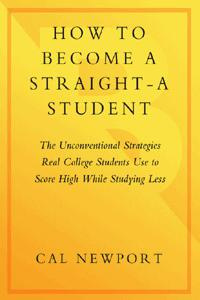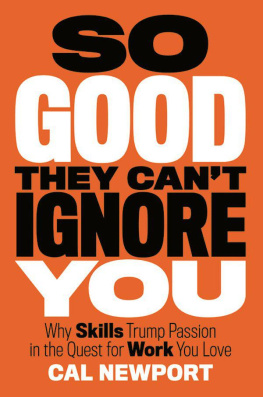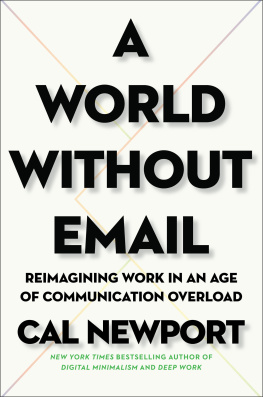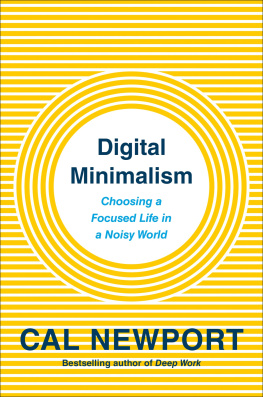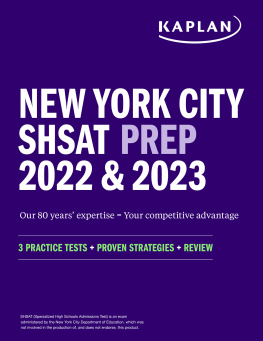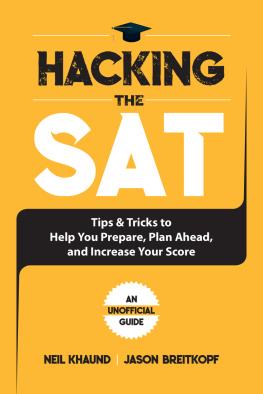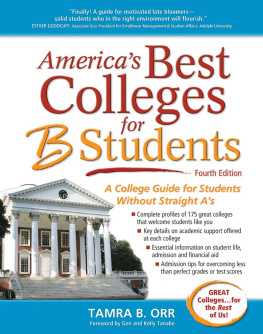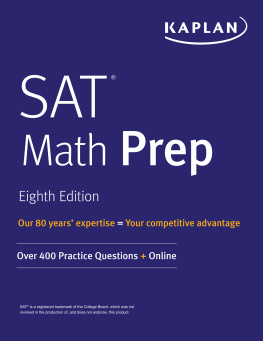Cal Newport - How to Become a Straight-A Student: The Unconventional Strategies Real College Students Use to Score High While Studying Less
Here you can read online Cal Newport - How to Become a Straight-A Student: The Unconventional Strategies Real College Students Use to Score High While Studying Less full text of the book (entire story) in english for free. Download pdf and epub, get meaning, cover and reviews about this ebook. year: 2006, publisher: Three Rivers Press, genre: Home and family. Description of the work, (preface) as well as reviews are available. Best literature library LitArk.com created for fans of good reading and offers a wide selection of genres:
Romance novel
Science fiction
Adventure
Detective
Science
History
Home and family
Prose
Art
Politics
Computer
Non-fiction
Religion
Business
Children
Humor
Choose a favorite category and find really read worthwhile books. Enjoy immersion in the world of imagination, feel the emotions of the characters or learn something new for yourself, make an fascinating discovery.
- Book:How to Become a Straight-A Student: The Unconventional Strategies Real College Students Use to Score High While Studying Less
- Author:
- Publisher:Three Rivers Press
- Genre:
- Year:2006
- Rating:3 / 5
- Favourites:Add to favourites
- Your mark:
- 60
- 1
- 2
- 3
- 4
- 5
How to Become a Straight-A Student: The Unconventional Strategies Real College Students Use to Score High While Studying Less: summary, description and annotation
We offer to read an annotation, description, summary or preface (depends on what the author of the book "How to Become a Straight-A Student: The Unconventional Strategies Real College Students Use to Score High While Studying Less" wrote himself). If you haven't found the necessary information about the book — write in the comments, we will try to find it.
How to Become a Straight-A Student: The Unconventional Strategies Real College Students Use to Score High While Studying Less — read online for free the complete book (whole text) full work
Below is the text of the book, divided by pages. System saving the place of the last page read, allows you to conveniently read the book "How to Become a Straight-A Student: The Unconventional Strategies Real College Students Use to Score High While Studying Less" online for free, without having to search again every time where you left off. Put a bookmark, and you can go to the page where you finished reading at any time.
Font size:
Interval:
Bookmark:


Contents
Cover Page
Title Page
Introduction
Part 1. Study Basics
Step 1 Manage Your Time in Five Minutes a Day
Step 2 Declare War on Procrastination
Step 3 Choose When, Where, and How Long
Part One Cheat Sheet
Part 2. Quizzes and Exams
Step 1 Take Smart Notes
Step 2 Demote Your Assignments
Step 3 Marshal Your Resources
Step 4 Conquer the Material
Step 5 Invest in Academic Disaster Insurance
Step 6 Provide A+ Answers
The Plan in Action
Part Two Cheat Sheet
Part 3. Essays and Papers
Step 1 Target a Titillating Topic
Step 2 Conduct a Thesis-Hunting Expedition
Step 3 Seek a Second Opinion
Step 4 Research like a Machine
Step 5 Craft a Powerful Story
Step 6 Consult Your Expert Panel
Step 7 Write Without the Agony
Step 8 Fix, Dont Fixate
The Plan in Action
Part Three Cheat Sheet
Conclusion
Acknowledgments
Getting in is just the beginning
Copyright Page
Introduction
My friends always wondered why I was never in the library, but instead in the student center socializing, or at a party, or at an event. They said I made it all look so easy.
Anna, a straight-A college student
T his is not your average college study guide. Unlike the titles next to it on the shelf, none of the advice presented here was devised by professors or self-proclaimed academic skills experts. I promise that you wont find any mention of the Cornell note-taking method, mental map diagrams, or any other optimal learning technique crafted in an office or laboratoryenvironments far removed from the realities of typical college life.
Instead, this book revealsfor the first timethe study habits used by real straight-A college students. All of the advice that follows was distilled from a series of interviews I conducted with a large group of top-scoring undergraduates. These participants were drawn predominantly from the Phi Beta Kappa rolls of some of the countrys most rigorous colleges and universitiesincluding Harvard, Princeton, Yale, Dartmouth, Brown, Columbia, Duke, Amherst, and Skidmoreand they were carefully chosen to represent a wide variety of academic concentrations. In each interview, I asked the student to detail his or her study habits. The questions ranged from the general (How do you defeat the urge to procrastinate?) to the specific (What techniques or systems do you use to locate and organize sources for a research paper?). If the questionnaire revealed the student to be a grindsomeone who earns high grades simply by studying an excessive amountI discarded the responses. I was interested only in students who improved their grades through smarter, more efficient study skillsnot through longer hours and more painful study sessions.
How did I know such students existed? I am one of them . When I arrived as a freshman at Dartmouth College, I had no idea how to prepare for exams or write college-level papers. Like most students, I left high school believing that to study meant to reread your class notes and assignments as many times as possible and that paper writing required you to sit down in front of your computer and start typing until you finished. The problem, however, is that college is not high school. The material to be mastered is much more complicated and the professors have higher expectations. In the college environment, simple brute force study methods can end up requiring a lot of time and causing a lot of pain. Nevertheless, most students still rely on them. And this is why they find themselves regularly pulling all-nighters and developing an antagonistic attitude toward their courses. The taxing effects and spotty success of these methods also underlie the common belief that only geniuses and grinds can score top grades.
When I first entered college, I shared in these beliefs. But soon I became dubious. It didnt take long for me to decide that there had to be a better way to learn the material. The results of my studying using simple techniques varied widelyId spend all night hacking away at an essay and end up scoring a B-, or give what I thought was a frantic last-minute review for a quiz and score an A. I constantly felt like I was behind in my reading, and there always seemed to be new deadlines on the horizon that I had to scramble to meet. It was truly a chaotic existence. But when I looked around, all of my friends seemed to be having the same experienceand none of them seemed willing to question it. This didnt sit right with me. I wasnt content to work in long, painful stretches and then earn only slightly above-average grades for my efforts. I wanted to be exceptional. And I wanted to achieve this without having to sacrifice sleep or my social life. To many students, such a goal may sound hopelessly hubristic. But Im an optimist by nature, and, observing the sorry state of my current study skills, I was convinced that I could do better.
It took me most of my freshman year to construct, through repeated experimentation, a toolbox of sufficiently improved study habits. But once I had perfected them, the results were profound. Of the thirty-six courses I took between my sophomore and senior years of college, I scored exactly one A- and 35 perfect As. The most stunning piece of this transformation, however, was how much less time I had to spend on studying. As my strategies became more refined, the hours required were reduced. By my senior year it got to the point where, during finals periods, I would sometimes pretend to be heading off to the library just so I wouldnt demoralize my roommates, who were preparing for yet another grim all-nighter.
What was my secret? Efficiency . The simple truth is that the brute force techniques used by most students are incredibly inefficient. When it comes to exam preparation, passive review is not an effective way to learn complicated concepts. Its also mentally draining, which further diminishes the rate at which you can absorb and internalize information. For paper writing, this same problem holds. When you approach the task without proper preparation, it becomes incredibly tiring and you can end up spinning your wheels. After a while, even the formation of coherent sentences becomes difficult and time intensive. In contrast, the techniques I came up with were so streamlined that I could learn more material than my classmates and actually spend less time studying. By eliminating stupid habits and wasted effort, I transformed exam prep and paper writing from a dreaded chore to a targeted activity.
For a while, I was convinced that I was unique for having discovered such a smart approach to learning. But, alas, this illusion was soon shattered. It occurred during the winter of my senior year, when I was attending a ceremony celebrating my induction, along with thirty other classmates, into Phi Beta Kappa. This group represented, more or less, the thirty students with the highest G.P.A.s out of my class of over a thousand. Accordingly, I had arrived at the venue prepared to spend the evening with some serious nerds. As it turns out, however, I was in for a surprise.
Upon walking through the door that night, I was immediately struck by how many of the other students I knew socially. These were people who, given their level of visibility on campus, I never would have imagined were scoring straight As. They were magazine editors, frat boys, and crunchy environmentalists. I knew them from parties and campus clubs and through mutual friends. They were, for the most part, normal, well-rounded, and interestingnot at all the type of super-grind one might assume would occupy such an elite level of academic achievement. The lesson of that night was obvious: Perhaps I was not, in fact, as unique as I had first imagined. Maybe there were others out there who had discovered similar secrets to academic success.
Font size:
Interval:
Bookmark:
Similar books «How to Become a Straight-A Student: The Unconventional Strategies Real College Students Use to Score High While Studying Less»
Look at similar books to How to Become a Straight-A Student: The Unconventional Strategies Real College Students Use to Score High While Studying Less. We have selected literature similar in name and meaning in the hope of providing readers with more options to find new, interesting, not yet read works.
Discussion, reviews of the book How to Become a Straight-A Student: The Unconventional Strategies Real College Students Use to Score High While Studying Less and just readers' own opinions. Leave your comments, write what you think about the work, its meaning or the main characters. Specify what exactly you liked and what you didn't like, and why you think so.

